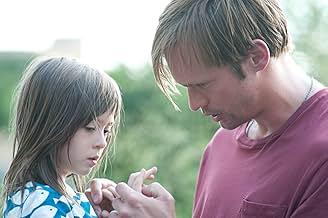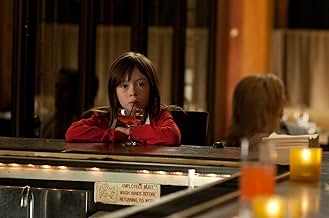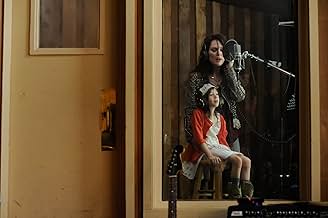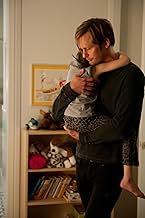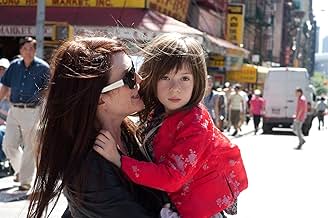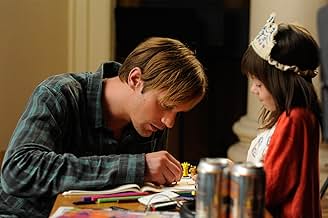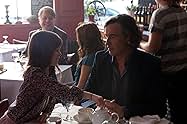NOTE IMDb
7,4/10
29 k
MA NOTE
À New York, une jeune fille est prise au milieu de l'âpre bataille que se livrent ses parents pour la garde des enfants.À New York, une jeune fille est prise au milieu de l'âpre bataille que se livrent ses parents pour la garde des enfants.À New York, une jeune fille est prise au milieu de l'âpre bataille que se livrent ses parents pour la garde des enfants.
- Réalisation
- Scénario
- Casting principal
- Récompenses
- 3 victoires et 8 nominations au total
Jesse Stone Spadaccini
- Martin
- (as Jesse Spadaccini)
Diana García
- Cecelia
- (as Diana Garcia Soto)
Avis à la une
This movie is a little gem. I read the New York Times review that said it was "Brilliant" or whatever, and I don't know if I'd go that far, but it's definitely the best movie about divorce and child custody I've ever seen, and it's nothing like Kramer vs. Kramer. It's actually really sweet and real feeling, mostly because you really identify with the little girl Maisie. All the adult actors are great, and sometimes funny (Steve Coogan), but I especially loved Alexander Skarsgard. He seems like a loser when you first see him, but he ends up being super loving, and his scenes with Maisie are really fun to watch. Haters are going to hate, but I think anyone would relate to this film about parents, kids, and finding people to love.
10isachs
A gorgeous film that manages to convey the emotion of childhood at its more heart-wrenching. The central performance by Joanna Vanderham is absolutely extraordinary, and reminds me of some of the greatest child performances I've ever seen on film. As her parents, Julianne Moore and Steve Coogan make you feel like you are right in the middle of the tumult of family life. Directors Scott McGehee and David Siegel have created a movie that feels like life, the vulnerability, the abruptness, the comedy, the joy.
With intimacy at times almost startling, this is one of the best adaptations of a novel by Henry James I've ever seen.
With intimacy at times almost startling, this is one of the best adaptations of a novel by Henry James I've ever seen.
It always amazes me when I see a really impressive child acting performance. This is one of an impressive collective of films where a young performer has been quite outstanding. But there is something of an important difference between this one and most others. While the likes of Tatum O'Neal (Paper Moon), Ivana Baquero (Pan's Labyrinth) or Haley Joel Osment (The Sixth Sense) were all brilliant, none of them were as young as Onata Aprile. When you consider that at her age she simply will be incapable of understanding all the nuances of the screenplay, it makes it all the more outstanding just how good she is. She doesn't really say a whole lot but her looks convey massive amounts of meaning. Her performance is so natural that it reminds me of kid's drawings – so unaffected, unpretentious and instinctive that adults can never faithfully replicate them. The acting by the entire cast here is top calibre but at times like this you cannot compete and Onata Aprile easily steals the show.
It's quite a disturbing story really. Maisie is a neglected child and it's not very pleasant seeing her be passed around from pillar to post being essentially disregarded. The view the film adopts is a child's one. We see Maisie peeking round corners, in the periphery watching, seeing but never fully comprehending but understanding more than she is given credit for. She seems to know more about right and wrong than her parents do, for example. They are in worlds of their own, ignoring their little girl in order to play out their own self-obsessed games. Steve Coogan and Julianne Moore are very good in these unsympathetic roles in which they make you understand why they are like the way they are without making us actually sympathise with them.
The film works so well because it's given such an unsentimental treatment. The story unfolds subtly and believably and it avoids saccharine. While Maisie's parents are the bad guys of the piece they're not really villains as such, just extremely poor parents and very selfish people generally. As it turns out, it's the parent's new partners who are left increasingly in charge of the little girl and they are slowly drawn towards each other too. Collectively they make for an actual workable and loving family unit. Both Alexander Skarsgård and Joanna Vanderham are also great as these much more sympathetic adults. Events ultimately progress to an ending that was upbeat without sacrificing believability; it's simultaneously inconclusive yet hopeful. I suppose one of the messages of What Maisie Knew is that what is important is what is best for the child, not what is convenient for blood parents.
It's quite a disturbing story really. Maisie is a neglected child and it's not very pleasant seeing her be passed around from pillar to post being essentially disregarded. The view the film adopts is a child's one. We see Maisie peeking round corners, in the periphery watching, seeing but never fully comprehending but understanding more than she is given credit for. She seems to know more about right and wrong than her parents do, for example. They are in worlds of their own, ignoring their little girl in order to play out their own self-obsessed games. Steve Coogan and Julianne Moore are very good in these unsympathetic roles in which they make you understand why they are like the way they are without making us actually sympathise with them.
The film works so well because it's given such an unsentimental treatment. The story unfolds subtly and believably and it avoids saccharine. While Maisie's parents are the bad guys of the piece they're not really villains as such, just extremely poor parents and very selfish people generally. As it turns out, it's the parent's new partners who are left increasingly in charge of the little girl and they are slowly drawn towards each other too. Collectively they make for an actual workable and loving family unit. Both Alexander Skarsgård and Joanna Vanderham are also great as these much more sympathetic adults. Events ultimately progress to an ending that was upbeat without sacrificing believability; it's simultaneously inconclusive yet hopeful. I suppose one of the messages of What Maisie Knew is that what is important is what is best for the child, not what is convenient for blood parents.
I've read five previously posted reviews of this film and see no reason to repeat what they've already said. I agree, for the most part, with the positive ones. And I suspect the negative ones were written by people whose established taste in movies should have steered them away from seeing this one in the first place.
What I'll add is, I guess, a mostly personal perspective. I've found that I am lately much more drawn to smaller, more deeply felt movies than to bigger, slicker, higher-production-value ones. To "What Maisie Knew," for example, than to "The Great Gatsby." Even though both source novels share a similar interior aesthetic, the treatment in the former stays inside the characters, where James focused the original (thus causing one of the previous reviewers' comments to the effect that "nothing happens" in the movie), while the latter (possibly because of Luhrmann's well-established directorial predilections)stays resolutely focused on the exterior spectacle and barely skims the surface of Fitzgerald's deeply rendered characterizations.
If you like smaller, more closely observed and deeply felt films, you'll like this one.
What I'll add is, I guess, a mostly personal perspective. I've found that I am lately much more drawn to smaller, more deeply felt movies than to bigger, slicker, higher-production-value ones. To "What Maisie Knew," for example, than to "The Great Gatsby." Even though both source novels share a similar interior aesthetic, the treatment in the former stays inside the characters, where James focused the original (thus causing one of the previous reviewers' comments to the effect that "nothing happens" in the movie), while the latter (possibly because of Luhrmann's well-established directorial predilections)stays resolutely focused on the exterior spectacle and barely skims the surface of Fitzgerald's deeply rendered characterizations.
If you like smaller, more closely observed and deeply felt films, you'll like this one.
10kcfl-1
This is what I hope Henry James would have written, were he alive today. The book is tough sledding, late James when he was dictating his novels (due to tendinitis), and there was no holding him back. At least one Harvard professor called him "the greatest American novelist," but this work is deservedly minor.
The movie was perfect, in the top 1% of all I've seen. The style was the antithesis of James, radical "showing" instead of "telling."
I think the title should have been "What Maisie SAW," but that's too titillating. What she knew or felt only her future therapist will learn. We do have a hint though when her father throws her mother's flowers away, and M explains, "He was allergic."
The movie was perfect, in the top 1% of all I've seen. The style was the antithesis of James, radical "showing" instead of "telling."
I think the title should have been "What Maisie SAW," but that's too titillating. What she knew or felt only her future therapist will learn. We do have a hint though when her father throws her mother's flowers away, and M explains, "He was allergic."
Le saviez-vous
- AnecdotesIn an interview on the NPR program "Fresh Air", Julianne Moore said that she drew on Courtney Love and Patti Smith for inspiration for her character in this movie, who is (like Love and Smith) a rock star who is also a mother.
- ConnexionsFeatured in At the Movies: Épisode #10.26 (2013)
- Bandes originalesRockabye Baby
Performed by Julianne Moore
Meilleurs choix
Connectez-vous pour évaluer et suivre la liste de favoris afin de recevoir des recommandations personnalisées
- How long is What Maisie Knew?Alimenté par Alexa
Détails
- Date de sortie
- Pays d’origine
- Sites officiels
- Langue
- Aussi connu sous le nom de
- Điều Maisie Đã Biết
- Lieux de tournage
- The High Line, Manhattan, Ville de New York, New York, États-Unis(Maisie and Lincoln play at the High Line)
- Sociétés de production
- Voir plus de crédits d'entreprise sur IMDbPro
Box-office
- Budget
- 6 000 000 $US (estimé)
- Montant brut aux États-Unis et au Canada
- 1 066 471 $US
- Week-end de sortie aux États-Unis et au Canada
- 21 480 $US
- 5 mai 2013
- Montant brut mondial
- 2 711 379 $US
- Durée1 heure 39 minutes
- Couleur
- Mixage
- Rapport de forme
- 2.35 : 1
Contribuer à cette page
Suggérer une modification ou ajouter du contenu manquant







